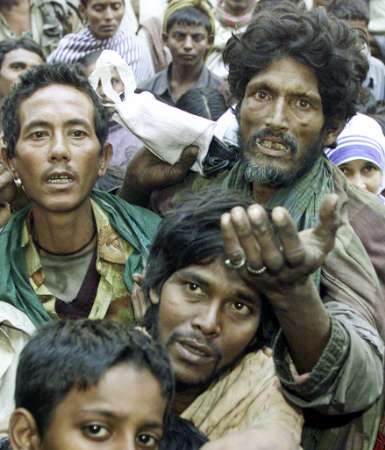.
.
.
Detroit is broke, Indian cities limping too





 Drive
to any Indian city. Chances are you will wade into chaotic traffic and
roads full of potholes. You'll see choked drains, overflowing and smelly
bins and streetlights that don't work. (Shanties, over crowded footpaths, people communing with nature out in the open, people blowing their vehicle horns for no particular reason, beggars accosting you to give, power cuts, bribe for routine daily work, extremely chaotic traffic, zero sense of 'system' and 'rule" in big and small cities...anything goes mentality, and cows and other animals roaming freely in the streets)
Drive
to any Indian city. Chances are you will wade into chaotic traffic and
roads full of potholes. You'll see choked drains, overflowing and smelly
bins and streetlights that don't work. (Shanties, over crowded footpaths, people communing with nature out in the open, people blowing their vehicle horns for no particular reason, beggars accosting you to give, power cuts, bribe for routine daily work, extremely chaotic traffic, zero sense of 'system' and 'rule" in big and small cities...anything goes mentality, and cows and other animals roaming freely in the streets) The reason for the mess isn't difficult to unravel. Most of our municipal bodies are cash strapped, unable to take care of the city's needs. The workforce is poor. Given the indifferent reputation of urban bodies, they tend to attract talent that can't rise to the challenges at hand.
An assessment of our cities following the Detroit debacle shows how a lethal mix of mismanagement and lack of autonomy is driving our cities into chaos and possibly, collapse, if not addressed urgently. Take Bangalore - a city showcased as India's answer to Silicon Valley. Work on the city underpasses has remained unfinished and sweepers can't be paid as the Bruhath Bangalore MahanagaraPalike (BBMP) is broke. The BBMP's outstanding bills stand at Rs 1,300 crore as on July 19.
The civic body has taken loans of over Rs 3,365 crore. Contractors hired by BBMP have stopped civic works in protest. Bhopal's story is no different. The municipal corporation's finances are weighed down by staff salaries and the growing city's needs. Although funds from the Jawaharlal Nehru National Urban Renewal Mission (JNNURM) breathed some life into the civic body, its health remains precarious.
The Kolkata Municipal Corporation (KMC) is no better. Efforts are on to boost revenues through improved property tax collection. The KMC's total budget is Rs 3,500 crore. Of this, Rs 1,900 crore comes from government grants. It generates Rs 1,600 crore. The total expenditure is Rs 3,400 crore. That leaves very little for development work.
In Goa, the Panaji Corporation too is passing through difficult times. It depends on the government for staff salaries and other expenses. Revenue generation is shoddy.
The picture is as bleak in Kochi. The civic body depends on property, advertisement, entertainment and professional taxes and grants from the central and state governments. It expects to generate Rs 877.97 crore in 2013-14 against an estimated expense of Rs 849.86 crore. "The corporation is cash-strapped and depends on the state to execute big infrastructure projects. Bulk of its income goes in paying salaries and pensions," Mayor Tony Chammany said. Worsening matters is the civic body's inability to collect property tax dues and user charges. Citizens stubbornly resist paying and the state's powerlessness is inexplicable.
The compact between the service provider and recipient has collapsed when it comes to civic bodies. Most of them survive on funds from the centre and states and the trickle that comes in as taxes.
"State government assistance keeps the Jaipur Municipal Corporation afloat. Most of our earnings go in paying our 8,000-strong staff," Nita Khaitan, chairperson, JMC finance committee, says. Municipal bodies across UP are limping.
Lucknow municipal commissioner RK Singh told TOI almost all big city corporations such as Allahabad, Varanasi and Kanpur have no more than Rs 100-125 crore to carry out repair and maintenance - a pittance when seen against the enormity of the work needed to lick these decrepit cities into shape. TOI spoke to municipal corporations in major cities across the country and the story was strikingly similar: Financial crunch, lack of governance and autonomy, factionalism, political interference and overstaffing were endemic.
A handful of cities though have bucked this trend - Ahmedabad, New Delhi, Mumbai, Nashik and Nagpur for instance. Experts say municipal corporations need greater autonomy and better fiscal management. These would help urbanization and make cities growth engines. This becomes imperative as more people flock to cities for jobs, education and a better life.